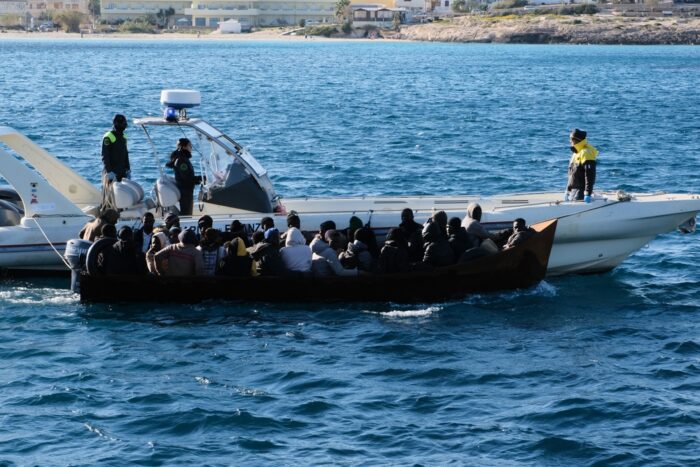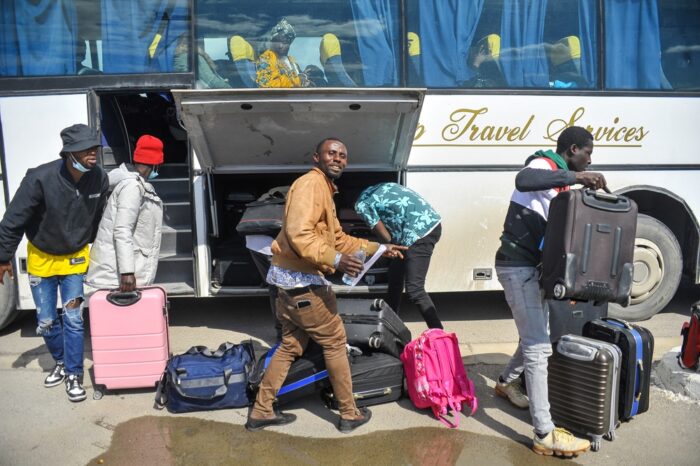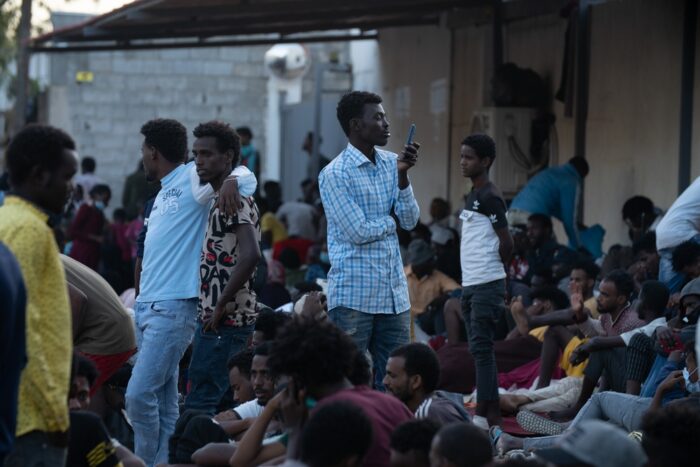Find all related Progressive Post
Progressive Post
I will never forget that day. The body bags lined the Favaloro quay without a break. I remember the moans of the survivors and the cries of those who had lost a loved one on the journey. The 3 October 2013 massacre off Lampedusa in which 368 people died is one of the most dramatic shipwrecks in the Mediterranean, tragically surpassed by the one of Pylos, Greece, last June.
Many of us, including myself – at the time still only a GP in Lampedusa – believed that in front of those coffins, national governments, the European Union and the entire world would start to look at migration as a structural phenomenon, not an emergency, avoiding the repetition of other shipwrecks. The Italian operation Mare Nostrum to save lives at sea, maintained for only one year, had seemed to many the beginning of a turnaround, of a new era. This was not the case. Instead, each tragedy has been followed by a new statement. Like after the fire at the Moria refugee camp in Lesbos, when Commission President Ursula Von der Leyen announced a new Migration Pact based on solidarity between member states that would overcome the Dublin Regulation and ease the burden on the countries of first entry.
Today, 10 years later, we can say that little or nothing has changed since that now so distant 3 October 2013. Instead, I think, there have been steps backwards. Negotiations to approve the new Pact on Migration by the end of the European Parliament legislature are ongoing, but the outcome is far from certain. The solidarity mechanism among the member states with the automatic relocation of 80 per cent of asylum seekers in all the countries of the Union, approved by the European Parliament after a long and laborious negotiation within the LIBE committee, does not seem to be among the priorities of the Council of the EU.
I have followed the whole path of the dossier of the new regulation on asylum and migration management as shadow rapporteur of the Socialists and Democrats (S&D) group, drawing on my experience of many years in Lampedusa as a doctor and on the stories I have been told. With my own eyes, I have seen the violence these people suffered in their scars, in the women’s skin burnt by petrol, in the legs skinned to see if a different colour was underneath. Because the bodies speak, even the dead ones. And horrified, I inspected many of them – too many – during the years in Lampedusa.
Being an MEP was not in my life plan. In 2019, when I decided to run for office, I did so because I felt powerless in the face of so much suffering and violence. Since the aftermath of the Lampedusa shipwreck, I started to tell what I had seen over the years, first to journalists and then in schools, to try to put a stop to the toxic narrative that right-wingers have always made of the migration phenomenon. Being a witness to such devastating events invests you with a great responsibility.
Going to Brussels has been and continues to be a furtherance of that commitment. I am convinced that only politics can really change the management of migratory flows. But I am also convinced that we have to get out of this crazy and continuous electoral race and get back to the real reason for doing politics: the advancement of our society and the common good. When, after Russia’s invasion of Ukraine, it was decided to activate Directive 55 of 2001, which grants temporary protection in the event of a mass influx of displaced persons by promoting solidarity among member states, I thought that the directive would finally be applied to those fleeing wars elsewhere in the world. Just think of how many Syrians or Afghans have had to rely on human traffickers all these years before being able to claim asylum. This has not been the case and the reason is simple: Europe has no unanimity of intent on these issues. The approval of the Migration Pact is another opportunity to change this. But this will only happen if we place solidarity between member states and to migrants at the heart of the pact. I believe that on the founding values of the EU, on the respect and protection of human rights and democracy, we cannot and should not compromise.
That is why the credibility of the proposal adopted by the European Parliament will depend on how we conduct the ongoing negotiations on the migration pact, even before the outcome of the reform. The agreement towards which the Council is pushing aims at strengthening returns and ‘externalising’ borders. Italian Prime Minister Giorgia Meloni praised the July MoU with Tunisia, and of the British government for the agreement with Rwanda (under the agreement, people applying for asylum in the UK could be relocated to Rwanda to have their asylum applications considered in the African country), and demonstrates the dastard will to take the whole EU in this direction. Unfortunately, Commission President Ursula Von der Leyen also said so in her speech in Strasbourg to report on the state of the Union: “the agreement with Tunisia is a model to be replicated”.
This short-sighted direction follows choices that have already been made and have turned out to be wrong and counterproductive. We have seen this for years with Libya, and up to a certain point with Turkey, and now also with Tunisia: these countries, with which the ultra-conservatives want to make agreements, use the migratory flows as cash machines from Europe. The result? A very high death toll (more than 26,000 since 2014, according to the International Organisation for Migration [IOM]), increasing arrivals, and declarations of states of emergency artfully created by right-wing governments that feed fear, insecurity and mistrust. This way of handling the issue undermines the foundations of our Union from within. Nothing can stop those who decide to leave because for these people the risks of the journey are often the only hope for life they have.
I want to close with the words of a great progressive, our own David Sassoli. For him, Europe was “a great power of peace placed between the Atlantic and the Urals, placed above the great African continent where the Europeans themselves went to steal everything, with slavery and colonialism, and to which they must restore a prospect of peace and development”. “Europe is its own system of rights and rules”, he often repeated in his speeches. Recognition of the rule of law, as our president Iratxe García Pérez also recalled, underpins the EU’s political dimension. To make agreements with those who do not respect the rule of law is to wreck the Union itself.
Photo credits: Shutterstock.com/EnriqueAlaezPerez
| Cookie | Duration | Description |
|---|---|---|
| cookielawinfo-checkbox-advertisement | 1 year | Set by the GDPR Cookie Consent plugin, this cookie is used to record the user consent for the cookies in the "Advertisement" category . |
| cookielawinfo-checkbox-analytics | 11 months | This cookie is set by GDPR Cookie Consent plugin. The cookie is used to store the user consent for the cookies in the category "Analytics". |
| cookielawinfo-checkbox-functional | 11 months | The cookie is set by GDPR cookie consent to record the user consent for the cookies in the category "Functional". |
| cookielawinfo-checkbox-necessary | 11 months | This cookie is set by GDPR Cookie Consent plugin. The cookies is used to store the user consent for the cookies in the category "Necessary". |
| cookielawinfo-checkbox-others | 11 months | This cookie is set by GDPR Cookie Consent plugin. The cookie is used to store the user consent for the cookies in the category "Other. |
| cookielawinfo-checkbox-performance | 11 months | This cookie is set by GDPR Cookie Consent plugin. The cookie is used to store the user consent for the cookies in the category "Performance". |
| csrftoken | past | This cookie is associated with Django web development platform for python. Used to help protect the website against Cross-Site Request Forgery attacks |
| JSESSIONID | session | The JSESSIONID cookie is used by New Relic to store a session identifier so that New Relic can monitor session counts for an application. |
| viewed_cookie_policy | 11 months | The cookie is set by the GDPR Cookie Consent plugin and is used to store whether or not user has consented to the use of cookies. It does not store any personal data. |
| Cookie | Duration | Description |
|---|---|---|
| __cf_bm | 30 minutes | This cookie, set by Cloudflare, is used to support Cloudflare Bot Management. |
| S | 1 hour | Used by Yahoo to provide ads, content or analytics. |
| sp_landing | 1 day | The sp_landing is set by Spotify to implement audio content from Spotify on the website and also registers information on user interaction related to the audio content. |
| sp_t | 1 year | The sp_t cookie is set by Spotify to implement audio content from Spotify on the website and also registers information on user interaction related to the audio content. |
| Cookie | Duration | Description |
|---|---|---|
| CONSENT | 2 years | YouTube sets this cookie via embedded youtube-videos and registers anonymous statistical data. |
| iutk | session | This cookie is used by Issuu analytic system to gather information regarding visitor activity on Issuu products. |
| s_vi | 2 years | An Adobe Analytics cookie that uses a unique visitor ID time/date stamp to identify a unique vistor to the website. |
| Cookie | Duration | Description |
|---|---|---|
| NID | 6 months | NID cookie, set by Google, is used for advertising purposes; to limit the number of times the user sees an ad, to mute unwanted ads, and to measure the effectiveness of ads. |
| VISITOR_INFO1_LIVE | 5 months 27 days | A cookie set by YouTube to measure bandwidth that determines whether the user gets the new or old player interface. |
| YSC | session | YSC cookie is set by Youtube and is used to track the views of embedded videos on Youtube pages. |
| yt-remote-connected-devices | never | YouTube sets this cookie to store the video preferences of the user using embedded YouTube video. |
| yt-remote-device-id | never | YouTube sets this cookie to store the video preferences of the user using embedded YouTube video. |
| yt.innertube::nextId | never | This cookie, set by YouTube, registers a unique ID to store data on what videos from YouTube the user has seen. |
| yt.innertube::requests | never | This cookie, set by YouTube, registers a unique ID to store data on what videos from YouTube the user has seen. |
| Cookie | Duration | Description |
|---|---|---|
| COMPASS | 1 hour | No description |
| ed3e2e5e5460c5b72cba896c22a5ff98 | session | No description available. |
| loglevel | never | No description available. |


